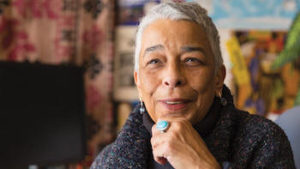
Thulani Davis
This date marks the birth of Thulani Davis in 1948. She is a Black writer, educator, and journalist.
She grew up in a home of educators in Virginia, Willie ("Billie") Louise (née Barbour) Davis and Collis Huntington Davis, Sr.; both of her parents taught at Hampton University. Davis attended the Putney School, graduated from Barnard College, and attended graduate school at the University of Pennsylvania and Columbia University. She was "schooled" for her first spoken word performance by Gylan Kain and Felipe Luciano of the Original Last Poets. Davis considers these two men, plus Amiri Baraka, June Jordan, Nikki Giovanni, Langston Hughes, and Robert Hayden, among the many poets of her artistic "lineage."
She became a performing poet, working with musicians and poets such as Ntozake Shange, Jessica Hagedorn, Roberto Vargas, Pedro Pietri, Janice Mirikitani, and others. They all produced books and concerts and broke new ground with offerings such as Third World Women. She also held a day job as a newspaper reporter for the San Francisco Sun-Reporter. She covered the Soledad Brothers trial and the Angela Davis case and interviewed Black Power leaders such as George Jackson and Huey Newton.
Davis' perspective on writing for the arts is: "Being a poet is the only real foundation for being able to move from prose to theater, or story to opera. Being a poet makes it easy to edit your own articles, to keep cutting the rhetoric even when it sounds really good. Being a poet makes it enjoyable to write a film, which is exquisitely economical--for a prose writer, the film could be excruciating. Being a poet is to understand that words can convey ideas and music, but writing in an American voice allows you to play percussion as well."
During the 1970s, Davis performed with Cecil Taylor, Joseph Jarman, Famoudou Don Moye, Anthony Davis, Ndiko Xaba, Juju, Oliver Lake, Arthur Blythe, and many others. Moving back to New York City in the 1970s, she began to work in performance art with Shange, Hagedorn, Laurie Carlos, and others and did a one-woman show. Through her brother, filmmaker Collis Davis, she also met many young Black filmmakers and began a long-term association with the making of documentaries. The first was a radio documentary examining musicians, composers, and war, aired on PBS.
She worked at the Village Voice as a proofreader and stayed for 13 years, rising to the senior editor position while continuing to write. In the 1980s, Davis began to work on essays, narrative poems, a first novel, and a first opera. She and Joseph Jarman founded the Brooklyn Buddhist Association and began a sangha that is now a thriving institution. She also taught writing part-time at Barnard College. In the 1990s, she continued doing opera, an oratorio, a film, another novel, and a full-length play. In 1993, she won a Grammy for the album "Notes for Aretha Franklin," and was nominated for the opera X. In 2000, Davis was asked to start another meditation group, which she credits for allowing her an ongoing healing process amidst all the events following the 9/11 attack on New York.
Since then, she has continued leading meditation groups whenever possible and expanded with the opportunity to do several screenplays. Her play, "Everybody's Ruby: Story of a Murder in Florida," premiered in 2001 at the New York Shakespeare Festival. Davis also completed a nonfiction work on her family's experience in the Mississippi Delta 100 years ago. Her work is passionate about history, justice, African American life, and the power of the facts of human experience.
Mode Records
PO Box 1262
New York, NY 10009
Phone: 1-212-979-1027
Fax: 1-212-842-2740